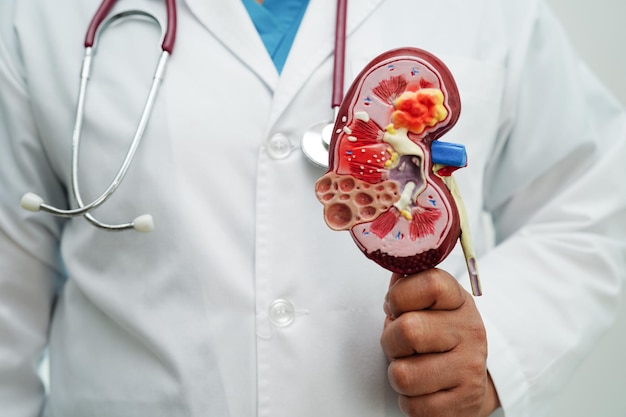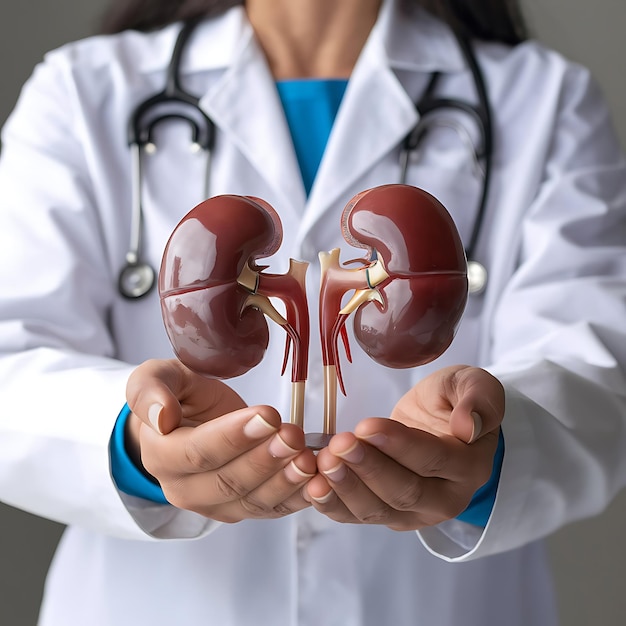
Understanding kidney health is crucial for maintaining overall wellness. Your kidneys play a vital role in filtering waste, balancing fluids, and managing electrolytes in your body. These bean-shaped organs are responsible for numerous critical bodily functions that, when compromised, can lead to severe health issues. Unfortunately, the importance of kidney health is often overlooked until problems arise, making it essential to be proactive in maintaining their function.
When your kidneys are healthy, they can effectively perform their tasks without causing any noticeable disruptions to your daily life. However, if they’re not in good shape, it can lead to kidney disease, which can have severe consequences. Kidney disease not only affects the kidneys but can also impact other organs and systems, emphasizing the interconnected nature of our body’s health. In this article, we’ll explore how to improve kidney health, the importance of a renal diet, and other practices that support kidney wellness. By taking these steps, you can help ensure your kidneys remain robust and effective throughout your life.
Comprehensive Kidney Care at Kidney MD
At Kidney MD, we specialize in providing advanced nephrology care to help patients maintain optimal kidney function and prevent complications. Our experienced team of nephrologists offers comprehensive diagnostic services, including blood tests, urine analysis, and imaging studies to assess kidney health. By identifying potential issues early, we create personalized treatment plans that address conditions such as chronic kidney disease (CKD), kidney stones, hypertension, and electrolyte imbalances. Our goal is to help patients protect their kidney function and enhance their overall well-being through proactive medical care and lifestyle modifications.
The Importance of Kidney Health
Your kidneys are two bean-shaped organs located in your lower back. They filter about 120 to 150 quarts of blood daily to produce urine, which is composed of waste and extra fluid. This filtration process is essential for removing toxins from the bloodstream, helping maintain a stable internal environment. The kidneys’ ability to filter and excrete waste efficiently is a cornerstone of overall health, as accumulated toxins can lead to various health complications.

Without healthy kidneys, waste would accumulate, leading to various health issues. This buildup can result in symptoms such as fatigue, swelling, and difficulty concentrating, and can progress to more severe conditions like hypertension or cardiovascular disease. Therefore, understanding the kidneys’ vital roles and how to support their function is essential for anyone looking to maintain long-term health and wellness.
Functions of the Kidneys
-
- Filtering Waste: Your kidneys remove toxins and waste from your bloodstream, which are then expelled through urine. This process is crucial in preventing the buildup of harmful substances that can impair bodily functions and lead to illness.
-
- Balancing Fluids: They regulate the body’s fluid levels to ensure you don’t retain too much or too little water. This balance is vital for maintaining blood pressure, ensuring cells function correctly, and preventing dehydration or fluid overload.
-
- Electrolyte Regulation: They maintain the balance of electrolytes like sodium, potassium, and phosphate, crucial for muscle function and other processes. Electrolyte imbalances can lead to serious complications, including muscle weakness, irregular heartbeats, and even life-threatening conditions.
-
- Blood Pressure Regulation: Healthy kidneys produce hormones that help control blood pressure. By influencing the amount of sodium in the blood and the constriction of blood vessels, kidneys play a direct role in maintaining cardiovascular health.
-
- Red Blood Cell Production: They release erythropoietin, a hormone that stimulates the production of red blood cells. Adequate red blood cell production is necessary to prevent anemia, which can cause fatigue and weaken the body’s ability to transport oxygen effectively.
Recognizing Kidney Disease
Kidney disease often develops gradually and may not show symptoms until it’s advanced. This asymptomatic nature makes regular monitoring and awareness of risk factors essential for early detection and intervention. Recognizing early signs can be vital for treatment and management, potentially slowing the disease’s progression and preserving kidney function.
Symptoms of Kidney Disease
-
- Swelling in Ankles, Feet, or Hands: This is often due to fluid retention, a sign that the kidneys aren’t eliminating waste efficiently. Swelling can also indicate more serious underlying issues, such as heart failure or liver disease, making it crucial to seek medical evaluation.
-
- Fatigue and Weakness: As kidney function declines, waste products build up in the blood, leading to decreased energy levels and general malaise. This symptom can significantly impact quality of life, reducing the ability to perform daily activities.
-
- Trouble Sleeping: Toxins remaining in the bloodstream can disrupt sleep patterns, leading to insomnia or restless sleep. Poor sleep can exacerbate other health issues, creating a cycle that further impacts kidney health.
-
- Frequent Urination, Especially at Night: This can be an early sign of kidney disease or other medical conditions like diabetes. It often indicates that the kidneys are struggling to concentrate urine, leading to more frequent trips to the bathroom.
-
- Muscle Cramps: Imbalances in electrolytes such as calcium and phosphorus can cause muscle cramps and spasms. These cramps can be painful and occur without warning, affecting daily comfort and mobility.
-
- Dry, Itchy Skin: This may occur as a result of mineral and bone disease related to kidney dysfunction. Itchy skin can be more than just an irritation; it can signify significant imbalances that require medical attention.
-
- Shortness of Breath if Fluid Builds Up in the Lungs: This serious symptom indicates advanced kidney disease and requires immediate medical evaluation. It may also point to heart problems, which can be exacerbated by poor kidney function.
If you experience these symptoms, consult a healthcare provider for proper diagnosis and treatment. Early intervention is critical in managing kidney disease and improving long-term health outcomes.
How to Improve Kidney Health
Improving kidney health involves various lifestyle changes and dietary adjustments. By making informed choices, you can enhance kidney function and overall wellness. Here are some practical steps to enhance kidney function and wellness.
Adopting a Renal Diet
A renal diet is specifically designed for individuals with kidney disease to reduce the workload on their kidneys. This diet focuses on minimizing the intake of certain nutrients that can be hard for kidneys to process. Here’s what to consider:
-
- Limit Sodium: High sodium intake can raise blood pressure and cause fluid retention, increasing stress on your kidneys. Aim for less than 2,300 milligrams per day. Reducing sodium can also lower the risk of heart disease and stroke, further supporting overall health.
-
- Control Protein Intake: While protein is essential, too much can burden your kidneys. Opt for high-quality protein sources like fish, poultry, and egg whites. Moderating protein intake can help maintain muscle mass while reducing kidney strain, especially important for those with decreased kidney function.
-
- Watch Potassium Levels: Excessive potassium can be dangerous for those with kidney disease. Foods high in potassium include bananas, oranges, potatoes, and spinach. Consult a dietitian to determine your optimal intake. Keeping potassium in check can prevent complications such as heart arrhythmias, which can be life-threatening.
-
- Manage Phosphorus: High phosphorus levels can weaken bones and damage blood vessels. Avoid foods like dairy products, nuts, and processed foods high in phosphorus. By managing phosphorus, you can help protect bone health and reduce the risk of vascular calcification.
Hydration and Kidney Health
Staying well-hydrated helps your kidneys function efficiently by aiding in waste removal and preventing kidney stones. Proper hydration is essential for maintaining blood volume and pressure, which are crucial for kidney filtration. However, if you have kidney disease, your fluid intake might need regulation. Always follow your doctor’s advice regarding fluid consumption. Overhydration can be as problematic as dehydration, so balance is key.
Regular Exercise
Regular physical activity improves cardiovascular health, aids in weight management, and reduces blood pressure, all of which benefit kidney function. Exercise helps maintain a healthy weight, reducing the risk of developing conditions like diabetes and hypertension, which are leading causes of kidney disease. Aim for at least 150 minutes of moderate exercise per week. This commitment can enhance not only kidney health but overall well-being.
Monitor Blood Pressure and Blood Sugar
High blood pressure and diabetes are leading causes of kidney disease. By keeping these conditions under control through medication and lifestyle changes, you can protect your kidneys. Regular monitoring of these parameters can help catch issues early, allowing for timely interventions. This proactive approach is crucial in preventing kidney damage and maintaining long-term health.
Foods That Are Good for Kidney Health
Certain foods are known to support kidney health. Incorporating these into your diet can be beneficial, providing essential nutrients without overloading your kidneys.
-
- Berries: Blueberries, strawberries, and cranberries are rich in antioxidants and low in potassium. These fruits can help reduce inflammation and oxidative stress, supporting kidney and overall health.
-
- Red Bell Peppers: High in vitamins A, C, and B6 while low in potassium. These nutrients are essential for immune function and overall health, making red bell peppers a great choice for kidney-friendly nutrition.
-
- Cabbage: Packed with vitamins and phytochemicals with a low potassium content. Cabbage is also rich in fiber, which can aid digestion and support heart health.
-
- Cauliflower: A good source of vitamin C, folate, and fiber. Its versatility in recipes makes it easy to incorporate into a kidney-friendly diet, providing nutrients essential for overall health.
-
- Garlic: Adds flavor without adding sodium and provides anti-inflammatory benefits. Incorporating garlic into your meals can enhance flavor while supporting heart and kidney health.
-
- Apples: High in fiber and anti-inflammatory compounds. Apples can aid in digestion and provide a sweet, nutritious snack option that supports kidney health.
Expert Guidance on Kidney-Friendly Nutrition and Wellness
Proper nutrition and hydration are essential for maintaining kidney health, and at Kidney MD, we provide specialized dietary counseling to support patients with kidney disease. Our nephrologists work closely with registered dietitians to develop renal-friendly meal plans that help regulate sodium, potassium, and phosphorus intake—key factors in preventing further kidney damage. We also emphasize the importance of hydration balance, guiding patients on the appropriate fluid intake based on their individual kidney function. Through wellness education, lifestyle coaching, and personalized care, we empower patients to make informed choices that support long-term kidney health.

Monitoring Kidney Health
Regular check-ups are essential for keeping track of your kidney health. Monitoring can help detect issues early, allowing for more effective management and treatment options. Tests like blood pressure checks, urine tests, and blood tests for creatinine and glomerular filtration rate (GFR) can help detect issues early. These tests provide a comprehensive view of kidney function, helping guide treatment decisions.
When to See a Doctor
If you notice any symptoms of kidney disease or have risk factors such as diabetes, hypertension, or a family history of kidney problems, it’s important to consult a healthcare provider. Early intervention can slow the progression of kidney disease and improve outcomes. Regular consultations with a healthcare professional can ensure that any changes in kidney function are addressed promptly, helping maintain health and quality of life.
Managing Kidney Disease with Advanced Treatment Options
For patients diagnosed with kidney disease, Kidney MD offers cutting-edge treatment solutions, including dialysis management, medication therapy, and pre-transplant evaluations. We are dedicated to slowing the progression of kidney disease, optimizing blood pressure control, and reducing complications through ongoing monitoring and specialized interventions. Our team provides compassionate, patient-centered care, ensuring that every individual receives the best possible treatment for their specific condition. Whether you are in the early stages of kidney disease or require advanced nephrology care, Kidney MD is your trusted partner in kidney health.
Understanding kidney health is essential for preventing and managing kidney disease. The National Institute of Diabetes and Digestive and Kidney Diseases (NIDDK) provides valuable information on kidney function, disease prevention, treatment options, and the latest research in nephrology. Explore their resources to stay informed and take proactive steps toward better kidney health.
Conclusion
Kidney health is integral to your overall well-being. By understanding the functions of your kidneys and adopting lifestyle changes, such as following a renal diet and engaging in regular exercise, you can support kidney wellness and reduce the risk of kidney disease. These proactive measures can have a profound impact on your health, enhancing both longevity and quality of life.
Regular monitoring and consulting with healthcare professionals are key steps in maintaining healthy kidney function. Take proactive measures today to ensure your kidneys remain healthy for years to come. By prioritizing kidney health, you invest in your overall wellness, ensuring a healthier, more vibrant future.

